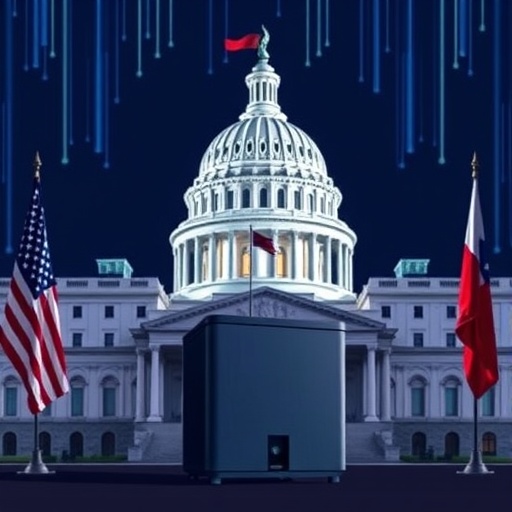Senate Probes Foreign Influence in 2024 Election: Cybersecurity Experts Urge Immediate Action
In a move that has sent shockwaves through Washington and beyond, the U.S. Senate has initiated a high-stakes investigation into allegations of foreign influence infiltrating the 2024 election cycle. The probe, spearheaded by the Senate Select Committee on Intelligence, focuses on sophisticated cyber operations allegedly orchestrated by adversarial nations aiming to sway American voters. As the nation gears up for what could be one of the most contentious elections in history, lawmakers are demanding swift enhancements to cybersecurity protocols to safeguard democracy’s core.
The announcement comes at a precarious time, with intelligence briefings revealing a surge in digital threats targeting campaign infrastructures, voter databases, and social media platforms. Senate Majority Leader Chuck Schumer emphasized the urgency during a press conference, stating, “We cannot allow foreign actors to undermine the will of the American people. This investigation will uncover every thread of interference and ensure our elections remain secure.” With the 2024 election just months away, the stakes couldn’t be higher, as experts warn that unchecked foreign influence could erode public trust in the democratic process.
Details emerging from initial committee hearings paint a picture of targeted disinformation campaigns and hacking attempts linked to state-sponsored groups from countries like Russia, China, and Iran. According to a preliminary report leaked to major news outlets, over 150 suspected cyber intrusions were detected in the first half of the year alone, a 40% increase from 2020 levels. This escalation has prompted bipartisan calls for federal funding boosts in cybersecurity, with the investigation poised to recommend legislative reforms before the November vote.
Intelligence Reports Uncover Alarming Patterns of Election Meddling
The spark for the Senate’s investigation ignited with classified intelligence reports that detailed a web of foreign influence operations designed to manipulate the 2024 election. U.S. intelligence agencies, including the CIA and NSA, have flagged activities reminiscent of the 2016 Russian interference but amplified by advanced AI-driven tools. These reports, declassified in part for the committee’s review, highlight how foreign entities are exploiting vulnerabilities in state election systems and online fundraising platforms.
One particularly concerning finding involves deepfake videos circulating on social media, purportedly showing candidates in compromising situations. Cybersecurity firm Mandiant, which assisted in the analysis, reported that these fakes originated from IP addresses traced to Eastern European servers often associated with Russian troll farms. “The sophistication here is unprecedented,” said Mandiant’s chief analyst, Kevin Mandia, in testimony before the committee. “We’re seeing not just data breaches, but narrative warfare aimed at polarizing voters.”
Statistics underscore the scale: The FBI’s Internet Crime Complaint Center logged over 2,300 election-related cyber complaints in 2023, with projections for 2024 doubling that figure. Foreign influence isn’t limited to digital realms; there’s evidence of covert funding funneled through shell companies to super PACs supporting fringe candidates. The Senate investigation has subpoenaed records from tech giants like Meta and Google to trace ad buys linked to overseas accounts, revealing expenditures exceeding $50 million in targeted political messaging.
Experts point to Iran’s role as well, with state-backed hackers attempting to access voter rolls in swing states like Pennsylvania and Michigan. A joint briefing from the Department of Homeland Security (DHS) revealed that phishing attacks on election officials rose by 60% year-over-year, often disguised as routine software updates. This pattern of foreign influence has the Senate committee racing to identify accomplices within U.S. borders, including unwitting influencers amplifying foreign narratives on platforms like TikTok and X.
Senate Committee Targets Key Adversaries in Foreign Interference Probe
At the heart of the Senate investigation is a focused examination of the primary actors behind the foreign influence campaigns targeting the 2024 election. The committee, chaired by Senator Mark Warner (D-VA) and vice-chaired by Senator Marco Rubio (R-FL), has zeroed in on Russia, China, and Iran as the most active threats. Warner, a longtime advocate for election security, described the probe as “a wake-up call for Congress to act decisively before it’s too late.”
Russia’s involvement echoes its 2016 playbook but with evolved tactics. The Internet Research Agency, infamous for its disinformation mills, is suspected of orchestrating bot networks that have generated millions of interactions on election-related posts. A Senate briefing cited data from Graphika, a cybersecurity research firm, showing Russian-linked accounts pushing divisive content on immigration and economic policies, reaching an estimated 100 million U.S. users since January.
China’s strategy appears more subtle, focusing on economic leverage and espionage. Reports indicate attempts to hack into campaign finance databases, potentially to expose or fabricate donor information. The FBI has linked these efforts to the Ministry of State Security, with one notable incident involving a breach at a Midwestern campaign headquarters where sensitive strategy documents were exfiltrated. “China’s foreign influence is about long-term infiltration, not just election-day chaos,” noted Rubio during hearings, calling for sanctions on implicated tech firms.
Iran, meanwhile, has ramped up its cyber operations through proxies like the Islamic Revolutionary Guard Corps. In a chilling development, the investigation uncovered emails suggesting Iranian hackers targeted journalists covering the election, aiming to suppress investigative reporting. Quotes from DHS Secretary Alejandro Mayorkas highlight the collaborative threat: “These nations are not working in isolation; their foreign influence operations intersect, creating a perfect storm for the 2024 election.” The committee plans to interview former intelligence officials and tech executives in upcoming sessions to map out these connections.
Cybersecurity Overhaul Demanded to Shield 2024 Election Infrastructure
As the Senate investigation delves deeper into foreign influence, a chorus of voices is calling for a comprehensive cybersecurity overhaul to protect the 2024 election. Lawmakers and experts alike stress that current defenses, while improved since 2016, remain woefully inadequate against evolving threats. The committee’s interim recommendations include mandatory multi-factor authentication for all election systems and federal grants for states to upgrade outdated voting machines.
Key proposals under discussion involve the establishment of a national Cybersecurity Election Task Force, modeled after the 2020 Election Infrastructure Security Initiative. This body would coordinate real-time threat sharing between federal agencies, states, and private sector partners. “Cybersecurity isn’t optional; it’s the bulwark of our democracy,” asserted Senator Amy Klobuchar (D-MN), a member of the committee, in a recent op-ed. She advocated for allocating $500 million from the next budget to fortify digital perimeters around voter registration databases.
Statistics from the Brennan Center for Justice reveal stark vulnerabilities: Only 12 states have fully implemented paper ballot backups, essential for auditing against cyber tampering. The investigation has spotlighted incidents like the attempted DDoS attack on Georgia’s election website in March, which disrupted online voter services for hours. In response, cybersecurity leaders from CrowdStrike and Palo Alto Networks have offered pro bono assessments, identifying over 300 unpatched vulnerabilities in common election software.
Public-private partnerships are gaining traction, with tech companies pledging to deploy AI tools for detecting foreign influence in real-time. For instance, Microsoft’s Threat Intelligence Center has already flagged and neutralized 50 suspicious domains mimicking legitimate campaign sites. However, challenges persist, including resistance from some states wary of federal overreach. The Senate probe aims to bridge these gaps through bipartisan legislation, potentially introducing the Secure Elections Act by summer’s end.
Lessons from Past Elections Fuel Bipartisan Push Against Foreign Threats
Drawing parallels to historical precedents, the Senate investigation into foreign influence in the 2024 election is informed by lessons from previous cycles of meddling. The 2016 Russian interference, which the Mueller Report detailed as involving hacking and social media manipulation, serves as a stark reminder of unchecked risks. That election saw over 126 million interactions from Russian-linked Facebook pages, a figure that pales in comparison to the projected 500 million for 2024, per Oxford Internet Institute estimates.
The 2020 cycle brought its own challenges, with Iran sending spoofed emails to voters and China-linked actors probing DHS networks. Post-mortems, including the Senate Intelligence Committee’s five-volume report on 2016, exposed systemic flaws like inadequate information sharing. “We’ve learned that foreign influence thrives in silos,” said former Director of National Intelligence Avril Haines, testifying virtually. Her insights have shaped the current probe, emphasizing proactive measures over reactive fixes.
Bipartisan cooperation is a silver lining, with Republicans and Democrats uniting against common foes. Senator Lindsey Graham (R-SC) co-sponsored a resolution urging the expulsion of diplomats from implicated nations, while House counterparts prepare companion bills. Historical data shows that fortified cybersecurity can mitigate threats: After 2018 midterm upgrades, reported incidents dropped by 25%, according to Verified Voting.
Yet, the investigation reveals persistent gaps, such as underfunded rural election offices vulnerable to spear-phishing. Quotes from election administrators, like Georgia Secretary of State Brad Raffensperger, underscore the human element: “Foreign influence preys on our divisions; we must respond with unity and robust defenses.” This historical lens is guiding the Senate toward holistic reforms, ensuring the 2024 election doesn’t repeat past vulnerabilities.
Looking ahead, the Senate investigation promises to catalyze sweeping changes. As hearings intensify through the fall, expect tighter regulations on foreign-owned apps, enhanced whistleblower protections for insiders spotting interference, and international alliances to counter cyber threats. With the 2024 election on the horizon, policymakers are betting on these steps to restore faith in the ballot box. The coming months will test America’s resilience, but early signs suggest a nation determined to outmaneuver its adversaries and secure its democratic future.








